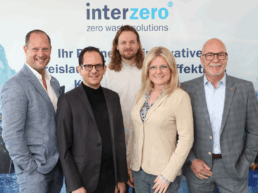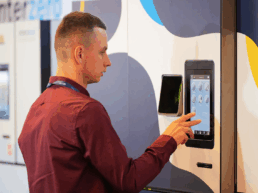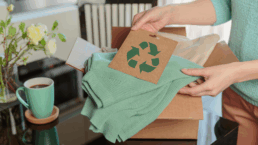A global problem – with growing pressure to act
The global textile industry faces massive challenges: Over 92 million tons of textile waste are generated annually – yet less than 1% of this is recycled into new textiles. This linear model is neither ecologically nor economically viable.
With Extended Producer Responsibility (EPR) for textiles, the industry is at a turning point. In the future, companies will be held more accountable – from the design to the end of their products’ lives .
Situation in Austria: The cycle is stalling
There is also an urgent need for action in Austria: More than 220,000 tons of textile waste are generated annually. Only around 26% of this is collected separately , and less than 2% is recycled.
A large portion ends up incinerated or landfilled—a waste of valuable raw materials. Even damaged textiles—with stains or tears—could serve as the basis for new textiles , provided suitable collection, sorting, and recycling structures are in place.
Separate collection of used textiles has been mandatory throughout the EU since January 1, 2025. Regulatory pressure is increasing – and with it, the responsibility for companies.
Regulatory change: EPR & PPWR – more responsibility for companies
The EU Packaging Regulation (PPWR) also entered into force at the beginning of 2025. Together with the EPR, these regulations mark a paradigm shift: companies that place products and packaging on the market will in future be responsible for their entire life cycle .
In Austria, the EPR currently applies to packaging, waste electrical and electronic equipment, and batteries. However , textiles are also increasingly becoming a focus of legislation . Countries such as France, Sweden, and the Netherlands have already introduced corresponding systems; Austria is working on national implementation .
For affected companies, this means that anyone who places textiles or textile components into circulation will also have to assume financial responsibility in the future.
Future textile cycle: What is necessary – and what is already being created
A functioning textile cycle requires more than separate collection. The challenges are diverse:
- Variety of materials , such as blended fabrics made of cotton and polyester
- Chemical residues and low quality in fast fashion
- High logistical effort in collection and sorting
- Lack of sales markets for high-quality recyclates
The goal: a functioning, circular textile economy that conserves resources, reduces waste and promotes long-lasting products.
Interzero: Clear position & active implementation
“The issue of fast fashion and its negative impact on our planet concerns us all!
— Thomas Glatz, Managing Director of Interzero Austria
Interzero positions itself clearly:
“The transition to a circular textile economy is one of the biggest transformations the industry has ever faced.”
Our self-image:
We are not just consultants – we are implementers.
Your advantage as an Interzero partner
Even if the legal pressure doesn’t yet directly affect all industries, the development is clearly marked . Interzero supports you with concrete solutions to ensure timely and future-proof action:
- Regulatory security through strategic advice and support
- Systemic solutions along the entire take-back and recycling chain
- Sustainable competitiveness through resource-saving circular models
Think about the future together. Act sustainably.
- Let us convince you of our expertise in collection, sorting and recycling .
- Interzero Austria develops individual take-back systems with which you can close your textile cycles .
- Now is the right time to take action. Talk to us – we will accompany you.
Latest News

Focus discussion on sustainable packaging solutions:
Cooperation with Leitbetriebe Austria

Machine service at Interzero:
Well looked after all round

Interzero Webinars & Events:
Stay up to date!
About Interzero:
Interzero is one of the leading service providers for closing product, material, and logistics cycles, as well as an innovation leader in plastics recycling with the largest sorting capacity in Europe. Under the guiding principle of “zero waste solutions,” the company supports over 80,000 customers across Europe in the responsible handling of recyclable materials, helping them improve their own sustainability performance and conserve primary resources. With around 2,000 employees, the company generates sales of over one billion euros (2021). According to Fraunhofer UMSICHT, Interzero’s recycling activities saved 1.2 million tons of greenhouse gases and 11.1 million tons of primary raw materials compared to primary production in 2023 alone. As a pioneer of the circular economy, Interzero is the recipient of the 2024 German Sustainability Award and the associated special prize in the transformation field of “Resources.” Further information can be found at www.interzero.at .
Find out more in our current brochure on ” resources SAVED by recycling “

